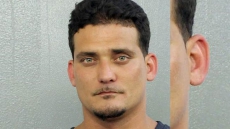TORONTO — A Toronto man found guilty of making and distributing child pornography around the world was sentenced to ten years in prison this week, but the time he has to spend behind bars was cut down after a judge found he was abused in jail.
Brian Way was arrested in 2011 in an investigation that resulted in more than 300 arrests in Canada, the United States, Mexico and other countries.
He was convicted last year on charges related to films he sold online through a company called Azov Films, 57 of which were found to be child pornography involving boys. He also pleaded guilty to charges over his home collection of child pornography.
Earlier this year, however, Way asked for a stay of his convictions or a reduced sentence after alleging he was abused while in custody.
At a sentencing hearing, he testified about being made to strip and "pirouette like a ballet dancer," left naked in a cell, punched in the face by a guard and "sexually assaulted" by a court officer, all in the first few days of his time in custody.
Justice Julie Thorburn, who heard Way's case, accepted some of the man's allegations and found that he had suffered verbal and physical abuse in custody which violated his Charter rights. She did not, however, think a stay of convictions would be appropriate and instead opted to reduce Way's sentence by six months.
Thorburn also gave Way a credit of seven years and ten months for time he had already spent in custody, which resulted in him being left with 20 months in his sentence.
The police officer who led the investigation into Way expressed disappointment in the sentence.
"Forty four children involved, particularly in these videos, who were exploited over numerous years...they won't get that portion of their life back," said Acting Det. Sgt. Paul Krawczyk. "They have been affected and continue to be affected and I just don't think the sentence reflects that."
Way's case involved three sets of charges — the first relating to his home collection of child pornography, the second pertaining to the child pornography films he sold through his business and the third concerning the possession of proceeds of crime from the film business.

Early in his legal proceedings, Way pleaded guilty to possession of child pornography found at his home and to making some of those images available to an undercover police officer.
Way went on to be tried by a judge alone on the charges relating to his business and was found guilty of charges of making, selling and distributing child pornography, as well as possessing money made from selling child pornography.
In her sentencing decision, Thorburn noted that Way had no previous record and had acknowledged his "egregious conduct" and the need for treatment.
"The nature and extent of the pornography collected by Mr. Way in his home causes me grave concern," Thorburn wrote in her sentencing decision. "However, the possibility of rehabilitation must not be ignored ... I also note that while his home collection was both vast and disturbing there is no evidence that he ever assaulted a child."
She also found that the images in the films and photographs offered for sale through Azov films were "at the low end" of child pornography as they did not show any explicit sexual acts among the boys.
"However, there is evidence that Mr. Way knowingly encouraged pedophiles to spend time with the young boys in the film in order to get footage for his films," she wrote. "There is also evidence he knew the boys were being groomed as, in the case of one boy, Mr. Way approached him shortly after his eighteenth birthday to request that he star in an adult pornography film for him."
During Way's trial, his lawyer argued the movies weren't sexual but depicted the nudist lifestyle by showing boys engaging in various activities while nude.
But Thorburn found the material, which was offered for sale in 92 countries, had resulted in psychological harm to young boys.

"It was agreed that the court could take into account that some boys felt disgraced when they realized the films were sold around the world, some suffered anxiety and agitation, lack of drive and some felt their lives had changed forever."
Way was also issued a $20,000 fine and three years probation.



